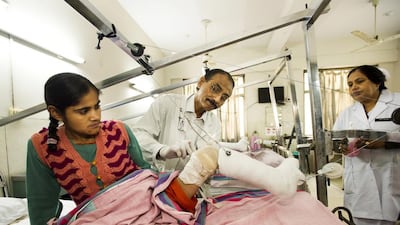NEW DELHI // On the fourth floor of St Stephen’s Hospital, Dr Mathew Varghese stands at the entrance to a room and allows himself a small sigh. “One day,” he says, “I hope to see all these beds empty.”
At the moment, they are not. The beds in this room and the next make up India’s only polio ward and hold nine patients, all recovering from or on their way to corrective surgery.
On Monday, India was eligible to be declared polio-free by the World Health Organisation (WHO), having completed three consecutive years without registering a single new case of the disease, which paralyses and kills children. For a country that, as recently as 2009, hosted 50 per cent of the world’s polio cases, the achievement is staggering.
The eradication of polio in India has involved a mammoth mobilisation of field workers to vaccinate young children against the disease. In a single day last February, for instance, 170 million children under the age of five were administered oral polio drops.
India has spent more than 120 billion rupees (Dh7.1bn) since 1995 in its fight against polio. The last case registered in India was on January 13, 2011 – a two-year-old in a village in West Bengal.
“Once we’re certified as a polio-free country, the polio immunisation campaign will continue for another two years and gradually decrease,” said Naveen Thacker, a paediatrician who served for seven years on India’s polio advisory group. “The end game is to be able to stop the vaccine altogether.”
But Dr Varghese, a slight man with a frequent smile, is quick to remind visitors that thousands of Indians who were infected by polio – years or even decades earlier – are still paralysed.
“Around 1994 or 1995, we used to have 600 patients a year,” he said. “Now we have around 125 a year. I suspect it will remain at this number from now on. There are so many polio patients out there to treat.”
One of them is 14-year-old Hashim Raza, who was infected before he was a year old. He came to St Stephen’s Hospital in October, from the village of Rampur in Uttar Pradesh, having lived with twisted limbs for most of his life.
“My hip and both my knees have been operated,” Hashim said, pulling up the legs of his pyjamas. One limb is straight; the other, however, still has a foot that is bent at an unnatural, 120-degree angle.
“They still have to do this last surgery, on that foot,” he said.
“Then I’ll get my calipers fitted, and I’ll go home.”
The polio ward at St Stephen’s Hospital was started 27 years ago, four years before Dr Varghese arrived here. Another physician, Balu Sankaran, had returned from a stint at the WHO, intending to start polio outreach campaigns in poor communities.
On his very first day, Dr Sankaran identified 120 children who could benefit from surgery. Word spread quickly about the non-profit hospital’s willingness to perform corrective surgeries on polio victims, and patients streamed through the doors.
For those who cannot afford the the costs – about 30,000 rupees for one operation – all services are provded free, paid for by the hospital or by donors such as Rotary International.
The polio virus, Dr Varghese explained, hits its targets like a whirlwind, infecting quickly and leaving devastation in its wake. Many children are paralysed in their lower limbs; some are afflicted more severely, leaving the trunk or shoulders deformed. In the most serious cases, the muscles controlling respiration become paralysed, resulting in death.
“Once paralysed, always paralysed,” Dr Varghese said. “A lot of people think I cure polio here. I don’t. I wish I did, but I don’t.”
What he does, instead, is lead his team of 17 orthopaedists through surgeries to correct or alleviate the deformities that are caused by polio. He looks only for improvements, to enable his patients to lead slightly more independent lives.
“Can I get a bedridden child into a wheelchair? Can I get a child in a wheelchair on crutches? If a boy is wearing calipers on his legs, can I take him from wearing large calipers to wearing small ones?” Dr Varghese said. “These are the questions I ask myself.”
The orthopaedic team at the hospital straightens deformed limbs and sometimes lengthens one leg to balance the other. Flailing joints are fused for stability. Callipers, braces and artificial limbs are made within the hospital, and physiotherapists spend months taking patients through exercises and training them in the use of their calipers.
Even as the number of patients coming in to see Dr Varghese has reduced, their age profile has also changed. Earlier, the beds were full of children between the ages of 5 and 14.
Now, however, the youngest person in the ward is Hashim.
In another traction bed, trussed into a system of ropes, pulleys and weights, lies Ajit, who is 15 years old and uses only one name. His left leg is encased in plaster of Paris, and it is being elevated by a physiotherapist. His foot is bent too, and Dr Varghese massages it tenderly.
The mass vaccination campaign against polio was not the ideal method, he said. “The West tackled polio by ensuring clean water and sanitation, so that the virus couldn’t spread.”
Had India adopted that same technique, many more problems could have been solved, ranging from malnutrition to waterborne illnesses such as cholera and typhoid.
“So in a way, the vaccination is a short cut,” Dr Varghese said. Then he smiled: “But I’m not complaining, of course. If it has eliminated polio, I’m happy.”
ssubramanian@thenational.ae

